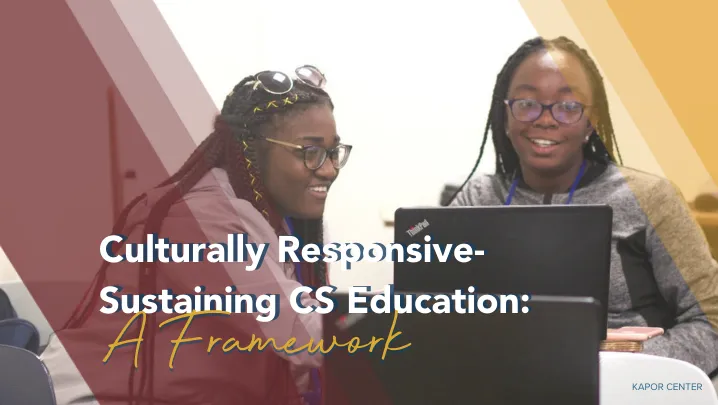For the past decade, the Kapor Center has conducted research on disparities in CS, tested interventions, and developed initiatives, all intended to address the complex barriers that contribute to racial and gender disparities in K-12 computer science education. We have worked alongside educators, advocates, policymakers, and organizations dedicated to broadening participation in computing, as rapid technological changes occur across our society and the globe. And while we have seen some incremental progress, despite the importance of computational literacies for all students, access to computer science education continues to remain unequally distributed by race, gender, socioeconomic status, and geography.
- Just 47% of high schools in the U.S. offer computer science courses.
- Black, Latinx, and Native American students and schools serving low-income communities are significantly less likely to offer CS courses
- Black, Latinx, and Native American students comprise 43% of U.S. K-12 enrollment, but just 23% of students enrolled in AP CS.
- Despite representing half of the K-12 population, girls represent just 29% of students taking AP CS courses, and Black, Latinx, and Native girls are even more underrepresented
We know that computer science education exists within a context of racial and socioeconomic inequality in education broadly and across all of our institutions. We believe that to create a more equitable future for computer science education, a multi-pronged approach centering racial justice must address foundational educational disparities, create equitable policies at the federal, state, and local levels, and invest deeply in the development of teachers, pedagogical practices, and curriculum that reflect and sustain students’ cultures, experiences, and interests.
As part of this future vision for computer science, we are excited to release the Culturally Responsive-Sustaining CS Education Framework, created to help CS educators design and implement inclusive educational practices to increase participation of Black, Latinx, Native populations, girls, and gender non-binary students in K-12 computing education, college, and careers.
We start with a definition:
Culturally responsive-sustaining computer science pedagogy ensures that students’ interests, identities, and cultures are embraced and validated, students develop knowledge of computing content and its utility in the world, strong CS identities are developed, and students engage in larger socio-political critiques about technology’s purpose, potential, and impact.
Culturally responsive-sustaining computer science pedagogy then has six core components, which directly inform instructional practices, curriculum development, teacher preparation and professional development, and approaches to implementing equitable K-12 computer science education.
The six core components are:
- Acknowledge Racism in CS and Enact Anti-Racist Practices
- Create Inclusive and Equitable Classroom Cultures
- Pedagogy and Curriculum are Rigorous, Relevant, and Encourage Socio-political Critiques
- Student Voice, Agency, and Self-Determination are Prioritized in CS Classrooms
- Family and Community Cultural Assets are Incorporated into CS Classrooms
- Diverse Professionals and Role Models Provide Exposure to a Range of CS/Tech Careers
“[I like] when a teacher is vulnerable, but also sees students as real people, jokes around with students, talks to them one on one, and talks about issues in the community. Those are effective CS teachers.”
The framework provides a roadmap for the adoption of culturally responsive-sustaining practices within computer science classrooms, closing equity gaps, and improving the outcomes of historically marginalized students in computer science education. This resource pushes the field to move beyond simply focusing on providing access to CS courses, focusing on “why” “how” and “to whom” computer science education is taught, and encouraging social, ethical, and political critiques of technology’s promise and purpose in society.
Over the next weeks, months, and years, we will partner with teachers, students, districts, nonprofit organizations, curriculum developers, and other CS education advocates to bring this framework to life and chart a path forward towards equity in computer science education. We believe that culturally responsive-sustaining computer science education can be a tool for liberation and justice.
“No longer can we approach the teaching of computer science as an apolitical practice, or conceptualize issues of power, ethics, and equity as separate from computer science teaching and learning.”
Dr. Allison Scott
- DOWNLOAD: Click here to download this new publication and learn about the core practices and components of the framework
- WATCH: Click here to watch the previously recorded June 24th National Webinar featuring our team, Dr. Yolanda Sealy-Ruiz and Dr. Aman Yadav, highlighting the key elements of this framework and its potential to drive change.
- ENGAGE: If you know an educator that may be interested in participating in a year-long professional development opportunity to implement the CRCS framework (with veteran CS teacher and facilitator, Shana V. White, who will support and guide the PD) — please share this opportunity to apply to be a part of the inaugural cohort.
- SHARE: Share the framework with your colleagues and join the conversation about how this effort relates to your work on social media using #KaporCRCS.
- LEARN MORE: Follow the Equitable CS Initiative by signing up for the newsletter, or to reach out with potential collaboration opportunities, email: Kalisha.Davis@kaporcenter.org
____
Acknowledgments: The project team greatly appreciates the national advisory boards and framework reviewers who contributed their expertise to this project and extend our gratitude to the distinguished scholars for the decades of work that this framework builds upon. This initiative is generously supported by Code With Google and Google.org through the Equitable Computer Science Curriculum Initiative and the Kapor Foundation.

